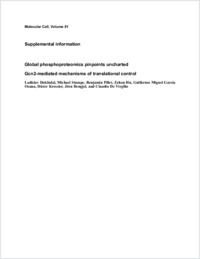Global phosphoproteomics pinpoints uncharted Gcn2-mediated mechanisms of translational control
DOKPE
- De Virgilio, Claudio University of Fribourg
- Dokládal, Ladislav University of Fribourg
- Stumpe, Michael University of Fribourg
- Pillet, Benjamin University of Fribourg
- Hu, Zehan University of Fribourg
- Garcia Osuna, Guillermo Miguel University of Fribourg
- Kressler, Dieter University of Fribourg
- Dengjel, Jörn
- 2021
Published in:
- Mol Cell. - 2021, vol. 81, no. 6, p. 1879-1889
TORC1
Gcn2
Gcn20
amino acid starvation
eIF2
eIF5
eukaryotic initiation factor 2
eukaryotic initiation factor 5
general control nonderepressible 2
target of rapamycin complex 1
translation initiation
English
The conserved Gcn2 protein kinase mediates cellular adaptations to amino acid limitation through translational control of gene expression that is exclusively executed by phosphorylation of the α-subunit of the eukaryotic translation initiation factor 2 (eIF2α). Using quantitative phosphoproteomics, however, we discovered that Gcn2 targets auxiliary effectors to modulate translation. Accordingly, Gcn2 also phosphorylates the β-subunit of the trimeric eIF2 G protein complex to promote its association with eIF5, which prevents spontaneous nucleotide exchange on eIF2 and thereby restricts the recycling of the initiator methionyl-tRNA-bound eIF2-GDP ternary complex in amino-acid-starved cells. This mechanism contributes to the inhibition of translation initiation in parallel to the sequestration of the nucleotide exchange factor eIF2B by phosphorylated eIF2α. Gcn2 further phosphorylates Gcn20 to antagonize, in an inhibitory feedback loop, the formation of the Gcn2-stimulatory Gcn1-Gcn20 complex. Thus, Gcn2 plays a substantially more intricate role in controlling translation initiation than hitherto appreciated.
- Faculty
- Faculté des sciences et de médecine
- Department
- Département de Biologie
- Language
-
- English
- Classification
- Biological sciences
- License
- License undefined
- Open access status
- green
- Identifiers
-
- DOI 10.1016/j.molcel.2021.02.037
- PMID 33743194
- Persistent URL
- https://folia.unifr.ch/unifr/documents/319831
Other files
Statistics
Document views: 45
File downloads:
- molecular-cell-d-20-01963_r5copy_1.pdf: 170
- Global_phosphoproteomics_Supplemental_information.pdf: 88
- mmc2.xlsx: 27
- Table S2.xlsx: 40


